The Toshiba THNSNJ480PCS3 480GB has been a hot topic on the forums recently as there have been some great deals on these drives. Luckily, we were able to snag a handful of them and put them through our benchmark suite. The THNSNJ480PCS3 features both powerloss protection and 1 DWPD/ 5 year endurance ratings so it is certainly targeted at the enterprise SATA market. We did put the drives though our full set of tests, so we will have comparisons with the dozens of drives we have previously tested.
Test Configuration
Since we are going to assume the use of already released hardware, we are using a legacy system for testing across the test suite:
- Motherboard: Gigabyte GA-7PESH3
- Processors: Dual Intel Xeon E5-2690 (V2)
- SAS Controller: LSI SAS 3008
- RAM: 64GB DDR3L-1600MHz ECC RDIMMs
- OS SSD: Kingston V300 240GB
We are using a SAS controller so one cannot compare results directly to consumer-driven setups where a SATA SSD is connected to an Intel PCH port. There is a latency penalty for going over the PCIe bus to a controller to SAS. It also is a reason NVMe is going to be a game changer in the enterprise storage space.
Toshiba THNSNJ480PCS3 480GB SSD Quick Benchmarks
For our quick tests during this part of the series we will just provide the quick benchmarks with only a bit of commentary. The results should be fairly straightforward and we have added a few comparable results to the charts.
AS SSD Benchmark
AS SSD is a solid benchmark that does not write compressible data to drives. The result is perhaps one of the best workstation SSD benchmarks available today.

Competition here is very strong, everything from the Samsung 845DC Pro with its higher overprovisioning and 3D V-NAND to the SanDisk Optimus SAS SSD and an Intel 730 480GB drive with an overclocked controller. Overall the Toshiba drive comes in the top half of all drives in each test.
CrystalDiskMark
CrystalDiskMark is another benchmark which gives non-compressible read/write numbers. This is in contrast to the ATTO Benchmark used by LSI/ Sandforce and its partners when they market a given solid state drive.
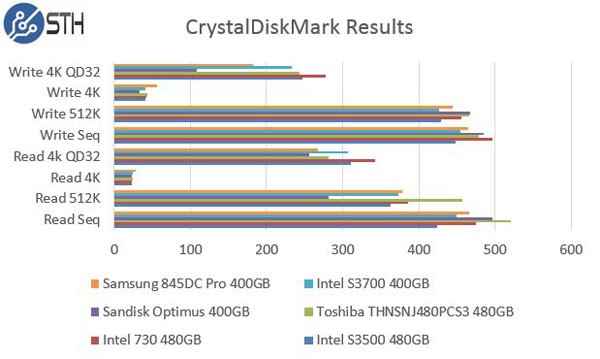
Again, we see even in a tough round-up the Toshiba 480GB offering is in the top half of results again, showing a standout performance on the read 512K and sequential read tests.
ATTO Benchmark
The value of the ATTO benchmark is really to show the best-case scenario. ATTO is known to write highly compressible data to drives, which inflates speeds of controllers that compress data like LSI/ SandForce does prior to writing on a given solid state drive.
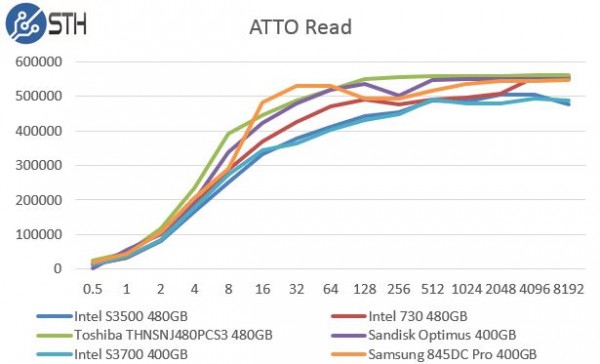
Here we see the Toshiba THNSNJ480PCS3 480GB drive post some impressive read speeds, holding the top spot in our comparison group on 9 of ATTO’s 15 data points.
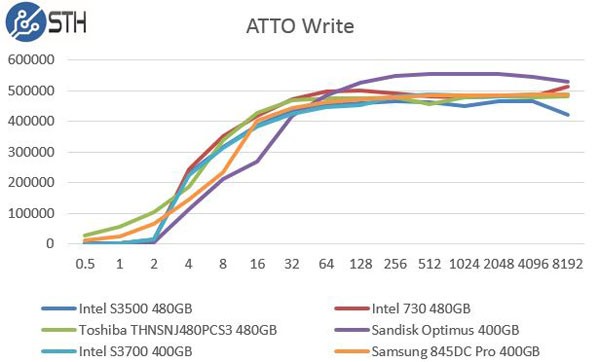
On the write side, we can see that the Toshiba THNSNJ480PCS3 excels at very small transfer size writes on the ATTO benchmarks. As the benchmark transitions to larger writes, it shows fairly average performance.
Conclusion
The Toshiba THNSNJ480PCS3 480GB SSD excels at many parts of our tests, even though we used a touch comparison group. After the first review samples we bought came in, we ended up picking up a few more drives as we were impressed with performance. The fact that these drives have large capacitors for power loss protection helps make them a solid choice. We found these Toshiba SATA III drives to work extremely well on our LSI/ Avago SAS 3008 controllers, which many SATA drives can have issues with. They are probably not the drives one would want to use for extremely heavy write workloads, but for mixed and read/ write workloads, they are a solid option.

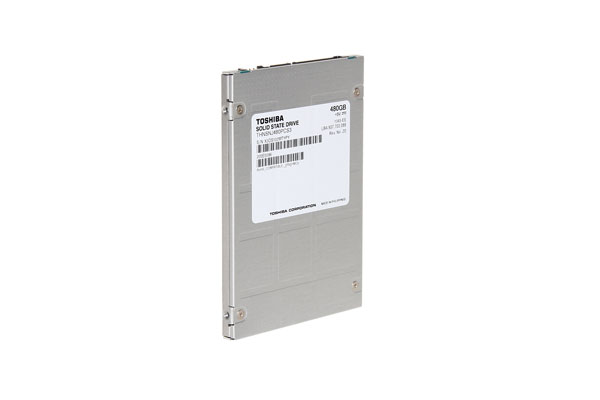


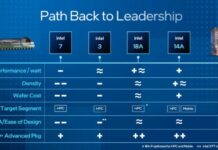
Hot drive. Looks slick
typo on the front page for this article in the article queue window. “Through” is misspelled.